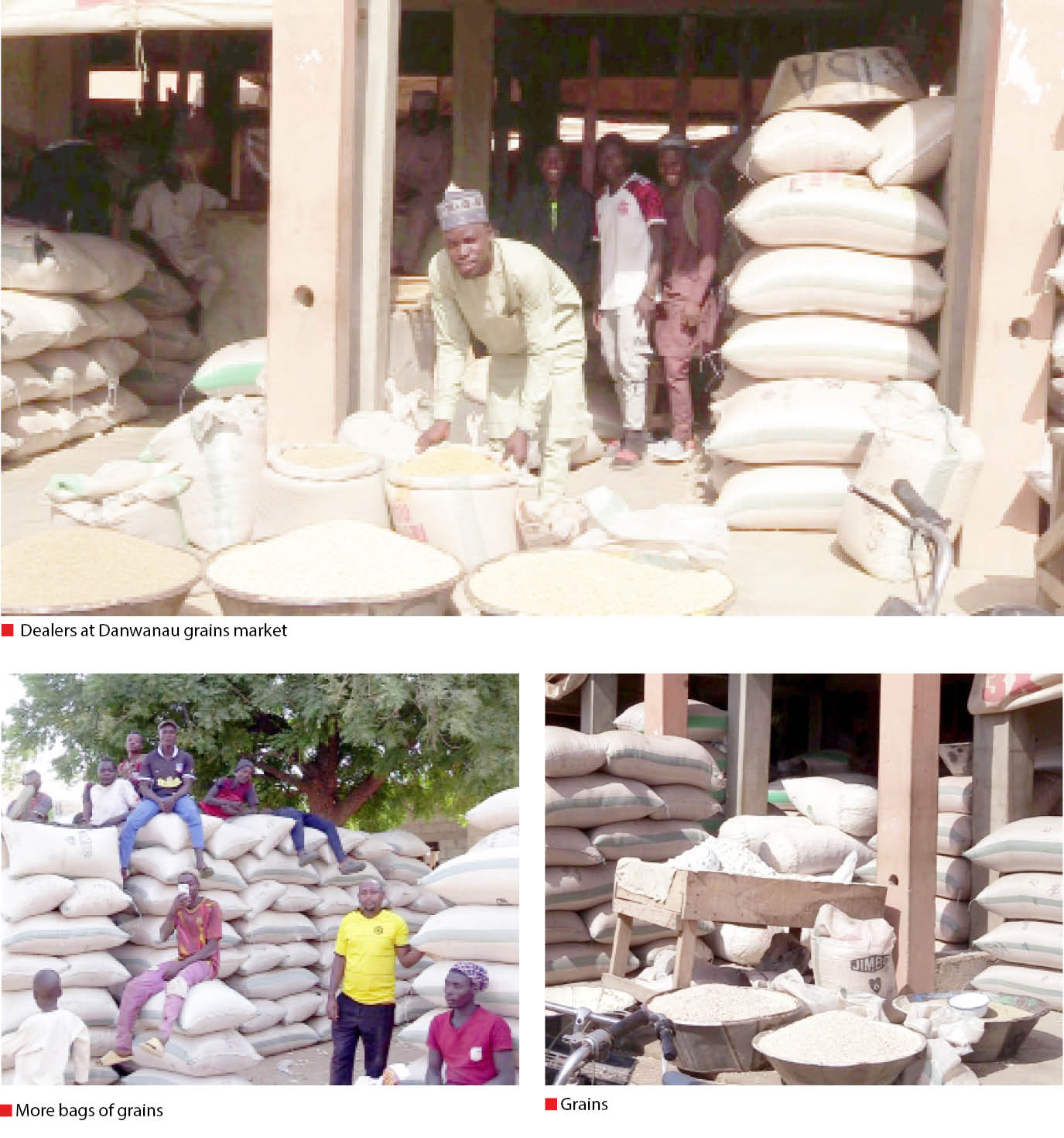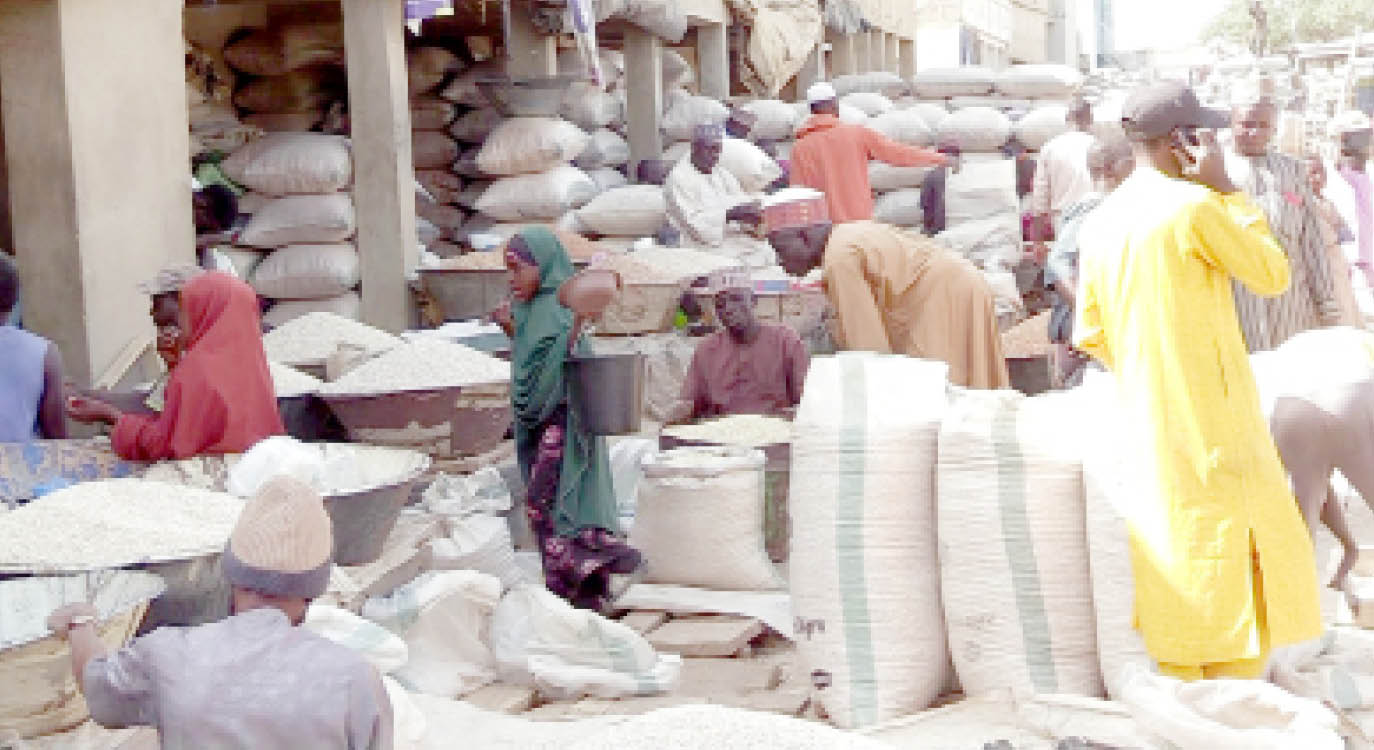Merchants from neighbouring countries and beyond are mopping up grains harvested by Nigerian farmers, investigation by Daily Trust Saturday has revealed.
The merchants from the African sub-region and other places are scrambling for farm produce for various reasons.
According to pundits, this nationwide grain scramble has resulted in prolonged price increases for important grains, such as maize, millet, sorghum, rice, ginger, hibiscus (zobo) and other oil seeds, such as soybeans and sesame.
The situation has pushed prices to record levels even during harvest periods, raising concerns that many Nigerians battling inflation (now at 28.2%) may be unable to purchase food during the lean season when prices typically skyrocket.
- Bandits Kill Four, Kidnap 39 In FCT, Niger
- NAHCON in dilemma as low turnout threatens 2024 Hajj preparations
Sources said most of the merchants from outside the country usually came with hard currencies, such as the US dollar, and as soon as they approach bureau de change operators, they smile to village markets with bags filled with naira notes, edging out home-grown merchants.
Our correspondents across the states report that many foreign nationals are purchasing grains and other crops, which is why prices remain high, even at harvest.
Katsina
In Katsina, our correspondent said that from Jibia to Dankama in Kaita Local Government Area, Mai’adua to Zango and Baure local government areas bordering Niger Republic, grain merchants move from one local market to another, struggling to buy the produce in large quantities.
The grains most needed are maize, millet, sorghum and beans, as well as sesame and hibiscus.
Prices of maize, millet and guinea corn at Jibia, Kaita, Mai’adua, Daura, Zango and Baure local government areas, at the moment is between N50,000 and N55,000 per 100kg bag. And it is expected that with the current scramble for grains, the prices are likely to rise in the coming weeks.
Ali Maje, a grain dealer in Katsina Central Market, said that if someone insists on old prices, he stood a risk of not getting the commodity because merchants are coming with a lot of money who waste no time in bargaining as they are ready to buy at whatever price.
Niger Republic, one of the neighbouring countries that buy farm produce from Katsina markets, has over the years been a business partner of Nigeria until its recent political crisis that attracted economic sanctions by the Economic Community of West African States (ECOWAS).
But despite the embargo, findings revealed that scramble for Nigerian grains continues.
Waisu Muhammadou, a Nigerien grain merchant, told our correspondent that maize, sorghum, soybeans, cocoyam and potato were the major produce being transported to Niger Republic on a weekly basis.
“For over 10 years I have been buying grain and other food items from Dandume, Sheme, Yankara, Kafur, Charanchi, and sometimes, Giwa in Kaduna State weekly and transport same to Tasawa, Maradi and Damagaram markets,” he said.
Muhammadou added that the sanctions placed by ECOWAS on their country has hampered the smooth running of their business as they have to rely on Nigerians to send in goods for them through diverted discreet routes.
“We are not finding it easy now because of ECOWAS sanctions. And high demand of food has put us on our toes to smuggle in food items from Nigeria despite the huge cost and dangers involved,” Muhammadou said.
He further said the rumoured plan by Nigerien authorities to change the country’s currency had made merchants to store their money in farm produce; hence the mad rush for Nigerian farm produce.
“Food items such as pumpkin, tomato casia tora, lemon and other fruits find their way into Niger through Illela in Sokoto State to Tawa, Kwonni and Tilaberi markets,” he said.
Another merchant from Mali, Sa’idu Abdullahi, said that unlike Niger Republic, there was no restriction of trade between the two countries.
“The major products we buy from Nigeria are Chilli pepper, palm and tamarind. We source them from Charanchi Dandume, Bakori and Funtua markets,” Abdullahi said.
He added that the crops were mainly used by cottage industries in Mali as raw material.
Garba Salisu, a grain dealer in Dandume market, said Ghana too was one of the countries buying food items from Nigeria.
He said, “In Ghana there is high industrial demand for soybeans and maize from Nigeria, and merchants from there buy them in large quantities from Katsina markets and Dawanau in Kano State. Beside the grains, desert dates, gingerbread palm and other wild fruits are being transported to Ghana weekly.”
Salisu added that merchants from Ghana, Benin, Mali, Niger and sometimes Togo were part of the weekly hustle and bustle in most Katsina markets.
“We cannot do without them; and in some cases, we send goods to those countries and get paid in the subsequent weeks,” he said.
He called on the authorities of ECOWAS to reconsider its stand on Niger Republic, saying that economic activities between the two countries have been seriously affected.
Abdullahi Umar, a bureau de change operator in Kano, said foreigners made double gain with their dollars.
“They get their dollars from somewhere and come to Nigeria with it; and of course you know how bad the value of our naira is. So, once they change their dollars and collect naira, they go to markets and do business. It is like getting the commodities as bonus,” he said.
Foreign farms having field day in Kano
In Kano State, the rate at which foreign firms are buying agro commodities after the 2023 wet season harvest is currently generating a lot of concern from stakeholders and other agro commodity users.
Findings by Daily Trust Saturday revealed that several merchants have stormed agro commodity markets in the state, mopping up sesame, how neighbouring countries, others feast on nigeria’s cheap grains

Our correspondent further gathered that many of such companies have already established their cleaning and grading outlets in most grain markets, especially Dawanau International Market.
A source at Dawanau international grain market told our correspondent that the act has caused a serious hike in the price of such commodities.
According to the source, a bag of sesame is now selling between N85, 000 and N100, 000 and a tonne of soybeans is selling for over N400,000.
Findings have also revealed that due to the activities of foreigners, some commodities have now become hot commodities sort by many companies; and due to the mad rush for the commodities, their prices have gone high and the commodities very scarce.
A merchant in Dawanau International Grains Market, Alhaji Abdu Musa Gwagwarwa, said the act of the companies had established a serious concern that many people have become scared of the aftermath of this move by the companies, and possible food shortage is being forecast.
Chinese too in the markets
In Taraba, our correspondent gathered that Chinese nationals are also making bulk purchase of farm produce in grain markets across the state.
Finding revealed that soybeans and maize are the major farm produce the Chinese are buying.
Daily Trust Saturday learnt that the foreigners are in some cases physically involved in the purchase of the farm produce, while in some cases, they use middlemen.
Markets where these nationals are involved in the purchase of farm produce include Mutumbiyu, Maihula and Garba-Chede .
Before the coming of expatriates into the grain business, a 100kg bag of soya beans was sold at N29, 000 but the price has jumped to between N32,000 and N34,000 per bag.
Price of maize has also gone up from N28, 000 to N35, 000 following demand of the produce by the Chinese nationals and other middlemen.
A farmer at Maihula, Tanimu Ali, told our correspondent that the coming of Chinese nationals into the grain business was a welcome development because they are mopping the commodity from the market.
He said that this year, farmers witnessed a bumper harvest of soybeans leading to the crash in the price of the commodity.
Tanimu further said farmers had produced very much quantity of soybeans, and there were less demand for the produce.
“The coming of foreigners to buy soybeans and other farm produce has brought relief to us because we have surplus of it and white beans as a result of the bumper harvest we witnessed,” he said.
Umar Muhammed, a farm produce trader at Mutumbiyu grain market, told Daily Trust Saturday that the coming of foreigners has stabilised the price of soybeans in the market and other farm produce in the state.
He said the foreigners were more interested in buying soybeans, maize and dried cassava, adding that the involvement of foreigners in buying farm produce has helped in giving the commodity a good price.
According to him, shortly before the coming of foreigners to grain markets, a100kg bag of soybeans was sold at N28,000, but now, the price has gone up to N34,000.
Ali Maihula, a large scale farmer said, “We are happy that foreigners and other middlemen are buying soybeans in large quantities. That has increased the price of the produce,” he said.
Encourage irrigation and make farmers rich – Experts
Some experts have said that government at all levels, and Nigerians should look at the recent development from positive perspective instead of lamentation.
Dr Murtala Abdullahi Kwara from the Department of Economics, Umar Musa Yar’adua University, Katsina, suggested immediate interventions and incentives to irrigation farming.
He also suggested commitment to agriculture and other non-oil sectors as the only alternative to the current rush for grains.
Kwara said unless this is done, the mop up may trigger another regime of hunger and malnutrition in the country.
“There is also the need for an urgent provision of improved seeds that are weather- friendly, accessible and affordable and that conform with the soil of each given area to attain food sufficiency that guarantees health, education, economic growth and all other forms of security Nigerians desire,” he said.
He said the government at all levels must remain committed to reducing poverty, provide support to sectors like agriculture, which is the second largest employer of labour,
He said anything short of this would be detrimental to the wellbeing, peace, prosperity and economic growth of Nigeria, which will no doubt trigger hunger and starvation.
An economist, Mr Musa Abubakar, said while the development is a plus to the Nigerian economy if properly organised, it is a minus to many households who would be affected by rising prices.
He said it was very vital to have a balanced and calculative analysis of the situation, adding that instead of exporting raw produce, Nigeria should concentrate on exporting finished goods.
Another economist, Abdullahi Aminu, said the government at all levels should guarantee security, provide mechanise farming implements and encourage citizens to embrace farming.
“Personally, I see the scramble as a positive development because we have been crying that there is no foreign exchange.
“Now, foreigners are coming with hard currencies and some people are complaining. I think what the government should do is to formalise the process.
“Government should encourage processing of the produce here in Nigeria, encourage people to establish cottage industries, and the hard currency inflow should be through the banking system,” he said.
Vincent A. Yusuf (Abuja), Ibrahim Musa Giginyu (Kano), Abdullahi Izma Yamadi, Idris Mahmud (Katsina) & Magaji Isa Hunkuyi (Jalingo)

 Join Daily Trust WhatsApp Community For Quick Access To News and Happenings Around You.
Join Daily Trust WhatsApp Community For Quick Access To News and Happenings Around You.


